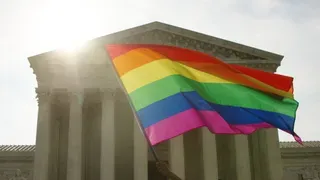February 8, 2010
Ohio Teacher Parades Long-Haired Boy as a Girl
Kilian Melloy READ TIME: 6 MIN.
An 11-year-old boy says that he was harassed and humiliated at school for having long hair. The boy, who lives in Milford, Ohio, in the greater Cincinnati area, says the bullying he endured included being forced to wear his hair in pigtails and being taunted with girls' names. What shocked his mother most, however, was that the chief culprits in the boy's harassment were a teacher and a teacher's aide, reported a Cincinnati.com story on Jan. 26.
The boy's mother, Amanda Anoai, has taken the case to court in a federal lawsuit that claims that the boy was paraded before his classmates with his hair styled into pigtails, while his teachers encouraged his classmates to hurl gender-based abuse at him. Anoai also alleges that the teacher, Tori Bothe, used her cell phone to photograph him. The boy was so badly traumatized, she says, that he had to be taken out of the school and sent to classes elsewhere. "They had no reason to touch my son, to embarrass him, to make him feel bad," says Anoai.
"He shouldn't have to switch elementaries and start over," Anoai, who now needs to drive her son a considerable distance to and from school, added. "We've had to change our lives because of this."
The suit is based partly on the claim that adults were the perpetrators of the bullying, and partly on the claim that the school's administration did nothing to intervene. The lawyer representing the family, Eric Deters, said that the boy was made the object of harassment throughout the school. "It wasn't enough to humiliate him in one class, they had to march him around to other classes," said Deters.
Reader response at Cincinnati.com was largely sympathetic to (and outraged on behalf of) the boy in question. Wrote one individual, "The teacher had no right to touch the student, to do his hair and to take photos of the child. This is completely unprofessional and unethical. And how much time out of the class did this take? The teacher should no longer have a job based on that alone."
Added the posting, "Finally, the shame of being called a girl! oh my yes. How absolutley [sic] awful. Because there is just nothing worse on earth than being a girl!!!! Right? What kind of message does this send to the rest of the school? Men= good// Women=bad? Why exactly is it a bad thing to be called a girl? All the girls in the school and the mothers in the school district should be offended that their children are being taught to de-value them and half the world's population."
Another reader related a tale from his own schooldays. "In fourth grade, all boys were required to sign up for baseball. I had no idea how to play baseball, and nobody was going to teach me, so all that I heard was "No, STUPID--Stand over THERE!" "No-No-No! Idiot! The OTHER WAY!"
I was way over it in record time, so I went over to my sisters across the playground, who were playing hopscotch. We had an amiable time playing together, until a teacher saw me playing there, outside her class.
"She dragged me inside and had the kids laugh at me for 'playing with girls,' the posting continued. "It has been 46 years since then, and I have never, ever played in any form of team sports in my entire life.
"During the three months between 6th and 7th grade, I grew to be six foot three and broad-shouldered. The coaches at grade school and high school begged me to play basketball or football. I flatly refused, and never explained why.
Actions such as this idiot teacher's DO have consequences. Kids make decisions that last a lifetime."
The suit echoes a similar case involving allegations of systematic harassment by Diane Cleveland, 39, and Walter Filson, 56, high school teachers for Minnesota's largest school district, Anoka-Hennepin. Claims of bullying by those teachers led to an investigation by the state's Dept. of Human Rights, which found that the student, 18-year-old Alex Merritt, had had his rights violated.
The teachers reportedly mocked Merritt for being gay, although Merritt says he is heterosexual. Merritt finally transferred to, and graduated from, a different school; both Cleveland and Filson continued with their teaching duties. The school district denied any wrongdoing, but settled with Merritt's family for $25,000. Cleveland was given a two-day suspension, but after one day called in sick, missing the rest of the week.
Among other allegations, Cleveland reportedly remarked that Merritt had a "thing for older men" when the student handed in a report about Benjamin Franklin, and joked during a screening of a movie that included a bathing suit scene that the sight of a scantily clad young woman on screen would not mean anything to the young man, adding that "maybe if it was a guy" on screen the scene in question would be a cause for concern.
Filson reportedly told students searching for participants for a fashion show to "Take [Merritt] because he enjoys wearing women's clothes."
The executive director of the Gay Lesbian Straight Education Network (GLSEN), Eliza Byard, spoke out against the teachers' alleged harassment of Merritt.
"That the school allegedly allowed harassment by students to continue even after it was made aware of the teachers' behavior is unthinkable," Byard stated. "We can only hope that the school district will do everything it can to ensure that no other student will ever have to go through the dehumanizing harassment this student suffered."
Added Byard, "Schools have a legal obligation to make sure their students have access to an education, and ignoring or encouraging anti-gay behavior deprives students of their right to an education."
Noted a GLSEN press release on the story, "Homophobic comments by teachers are, sadly, quite common. Nearly two-thirds (63%) of LGBT students said they had heard such remarks from teachers or other school staff, according to GLSEN's 2007 National School Climate Survey on the experiences of LGBT students in school."
The brief also noted a lack of safe schools policies and resources for GLBT youth, including gay-straight alliance clubs (GSAs). The GLSEN release also observed that a number of similar cases nationwide have been settled in favor of harassed GLBT youth.
The Milford boy was not reported as being gay, but gender stereotypes did evidently come into play. Similarly, longer hair and the use of eyeliner seemingly intensified bullying that was directed at a gay 15-year-old New York state student named Jacob, who said that due to the harassment he endured at school, "I hyperventilated... and I didn't want to come back the next day, or ever." Indeed, Jacob started skipping school out of fear for his safety; the bullying persisted despite efforts by Jacob's father to get school officials to intervene, but, said his father, they did "virtually nothing" to address the harassment. Eventually, Jacob's father filed suit, with the backing of the New York Civil Liberties union.
The suit sites Title IX and says that the statute covers harassment that proceeds from gender-based stereotyping, and harassment stemming from a student not conforming to those stereotypes. Said NYCLU attorney Corey Stoughton, "There is a growing recognition across the country that schools need to take harassment based on gender expression and homosexuality seriously." Added Stoughton, "If there is a settlement in this case, that's an affirmation of that principle."
Safe schools proponents say that more stringent laws are needed to combat bullying--but in itself, that is not enough; citing a recent string of suicides by pre-teen boys who were evidently driven to extremes due to harassment at school, proponents of safe schools add that where such laws do exist, they are not being enforced, a Sept. 14, 2009 Associated Press article reported.
The article noted that forty-four states have laws on the books regarding school bullying. The six that have no such laws are Montana, Hawaii, Wisconsin, Massachusetts, North Dakota and South Dakota, along with the District of Columbia. In Massachusetts, anti-gay activists have lobbied lawmakers against safe schools legislation, claiming that gays would use such laws to "indoctrinate" children into some sort of homosexual "lifestyle."
Last April 5, a Springfield, Massachusetts 11-year-old boy killed himself after enduring anti-gay taunts and bullying at school; it was the fourth suicide of a young student of 2009. A fifth suicide followed less than a month later in Atlanta, Georgia, where there are anti-bullying laws on the books. However, those laws apply to grades 6-12; the Atlanta suicide victim was in the fifth grade.
Kilian Melloy serves as EDGE Media Network's Associate Arts Editor and Staff Contributor. His professional memberships include the National Lesbian & Gay Journalists Association, the Boston Online Film Critics Association, The Gay and Lesbian Entertainment Critics Association, and the Boston Theater Critics Association's Elliot Norton Awards Committee.







